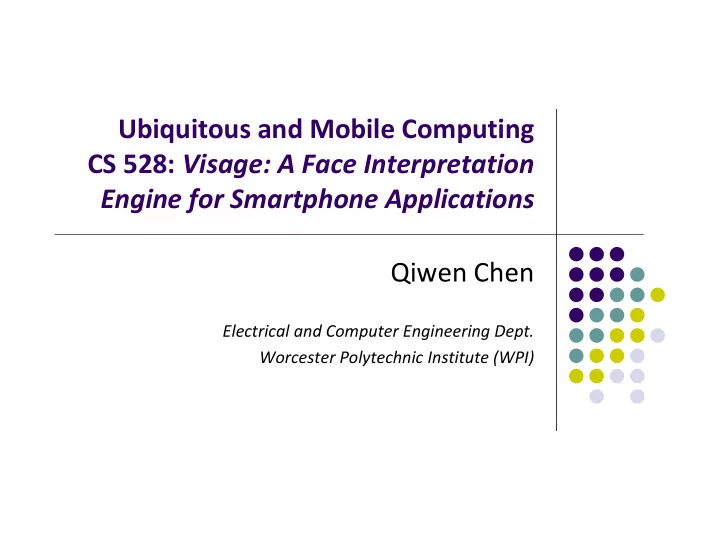

Ubiquitous and Mobile Computing CS 528: Visage: A Face Interpretation Engine for Smartphone Applications Qiwen Chen Electrical and Computer Engineering Dept. Worcester Polytechnic Institute (WPI)
Introduction Visage: A robust, real ‐ time face interpretation engine for smart phones Tracking user’s 3D head poses & facial expression Fuse data from front ‐ facing camera & motion sensor
Related Work Google Goggles
Related Work (Cont.) Recognizr Video Here Limited local image processing Mobile UI: PEYE Tracking 2D face representations
Methodology Challenges: User Mobility Movement of the phone Accelerometer & cause low image quality gyroscope sensor Varying light condition Analyze exposure level of face region Limited Phone Resources Operate in real ‐ time
Methodology (Cont.) Sensing Stage Preprocessing Stage Tracking Stage Inference Stage Visage System Architecture
Methodology (Cont.) Preprocessing Stage Phone Posture Component Gravity Direction: Mean of accelerometer Motion intensity: Variance of accelerometer & gyroscope
Methodology (Cont.) Preprocessing Stage
Methodology (Cont.) Preprocessing Stage Top: underexposed image, face region, and regional histogram; bottom: the image after adaptive exposure adjustment, face region, and regional histogram
Methodology (Cont.) Tracking Stage Feature Points Tracking Component Select candidate feature point Track points’ location Lucas ‐ Kanade method (LK) & CAMSHIFT algorithm
Methodology (Cont.) Tracking Stage Pose Estimation Component Pose from Orthography and Scaling with Iterations
Methodology (Cont.) Inference Stage
Methodology (Cont.) Inference Stage
Results Implementation GUI, API: Objective C Core processing & inference routines: C Pipeline: OpenCV Resolution: 192 x 144 (face size 64 x 64) Frame skipping scheme
Results Evaluation Operating On Apple iPhone 4 CPU and memory usage under various task benchmarks Processing time benchmarks
Results Evaluation Tilted angles: from ‐ 90 to 90 degrees, separated by an angle of 15 degrees. First row : standard Adaboost face detector. Second row is detected by Visage’s detector.
Results Evaluation Phone motion and head pose estimation errors (a)without motion ‐ based reinitialization (b)with motion ‐ based reinitialization
Results Evaluation Head Pose Estimation Error, 3 volunteers, 5 samples each
Results Evaluation Facial expression classi fi cation accuracy using the JAFFE dataset, 5 Volunteers. The model is personalized by user’s own data Confusion matrix of facial expression classification based on JAFFE
Application Streetview+ Show the 360 ‐ degree panorama view from Google Streetview
Application Mood Profiler
References [1] Recognizr, http://news.cnet.com/8301 ‐ 137723 ‐ 10458736 ‐ 52.html [2] Hua, G., Yang, T., Vasireddy, S.: PEYE: Toward a Visual Motion Based Perceptual Interface for Mobile Devices. In: Proc. of the 2007 IEEE int’l conf. Human ‐ computer interaction, pp. 39–48, Springer ‐ Verlag, Berlin (2007) [3] Viola, P., Jones, M.J.: Robust Real ‐ time Face Detection. In: Int’l J. Comput.Vision, 57, pp. 137 ‐ 154 (2004)
References [4] Baker, S., Matthews, I.: Lucas ‐ kanade 20 Years On: A Unifying Framework. In: Int’l J. Comput. Vision, 56(3),pp. 221 ‐ 255 (2004) [5] Dementhon, D.F., Davis, L.S.: Model ‐ based Object Pose in 25 Lines of Code. In: Int’l J. Comput. Vision 15, 1 ‐ 2, pp. 123–141 (1995) [6] Matthews, I., Baker, S.: Active Appearance Models Revisited. In: Int’l J. Comput.Vision, 60(2), pp. 135 ‐ 164 (2004)
References [7] Belhumeur, P.N., Hespanha, J.P., Kriegman, D.J.: Eigenfaces vs. Fisherfaces: Recognition using Class Specific Linear Projection. In: Trans. Pattern Anal. Mach. Intell., 19(7), pp. 711 ‐ 720 (1997) [8] Lyons, M., Akamatsu, S., Kamachi, M., Gyoba, J.: Coding Facial Expressions with Gabor Wavelets. In: Proc. 3rd IEEE Int’l Conf. Automatic Face and Gesture Recognition, pp. 200 ‐ 205, IEEE Computer Society, Washington, DC (1998)
Recommend
More recommend